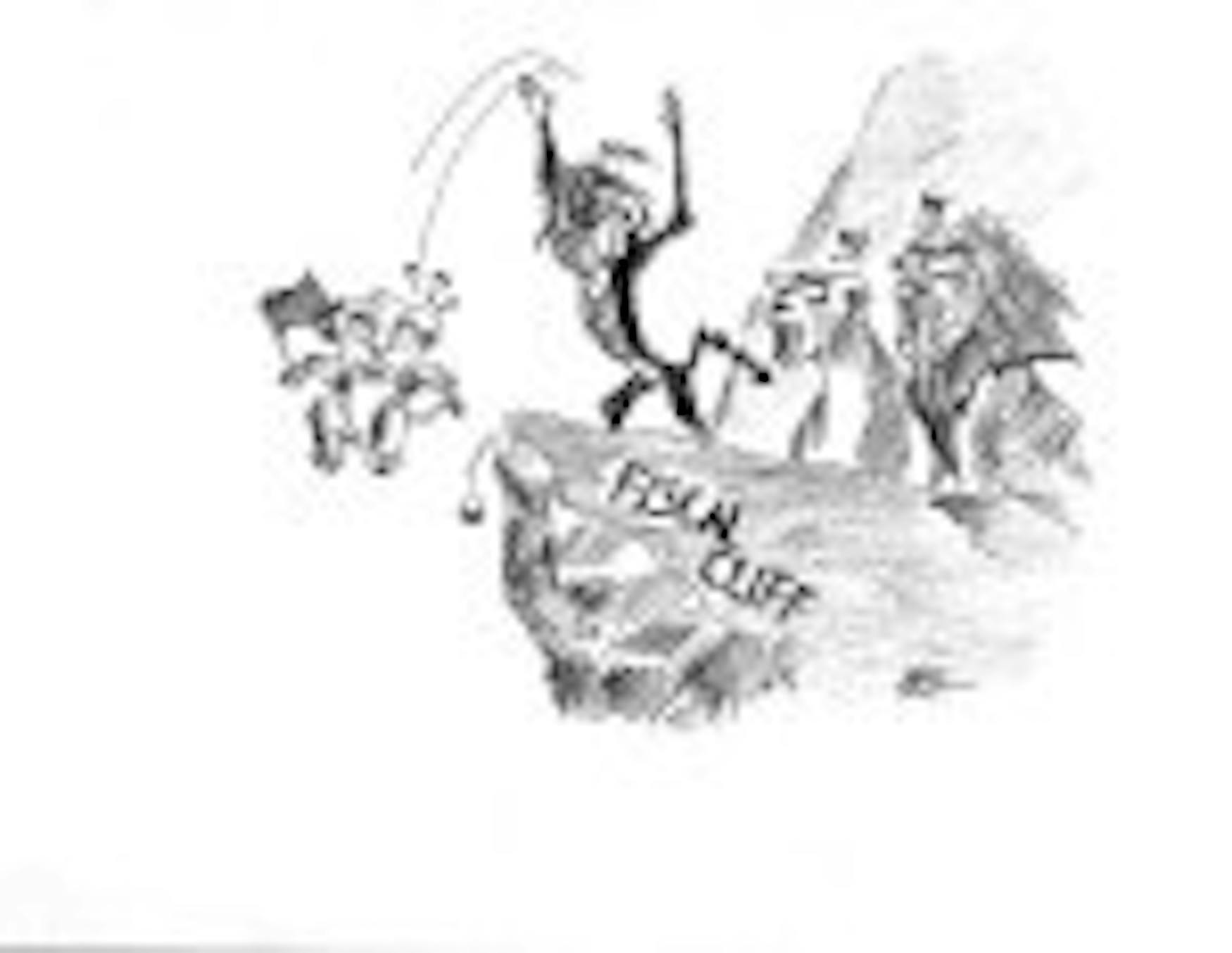Fiscal cliff requires minimal congressional action
About two years ago, issues of controlling the nation's deficit became a top priority of the new, Republican-controlled congress. The government was nearly shut down twice, and the United States came so close to defaulting on its debt that Standard & Poor's downgraded our nation's credit rating.
However, the debt ceiling is not, as many put it in 2011, a blank check for government spending, but rather, the bill for spending already accumulated.
Because of these political catastrophes, I became frustrated with the public's misunderstanding of spending, taxation and our budget deficits.
My friends and I held a series of mock budget summits in which we examined the budget numbers and formulated our own plan to balance the budget.
Because of this experience, I am proudly a self-proclaimed deficit hawk, who sees the importance in reigning in this nation's finances. I believe spending cuts, including to the military, tax increases and entitlement program reforms are all invaluable for success. For these reasons, I, for one, am not as concerned with the approaching so-called fiscal cliff as others may be.
The fiscal cliff, better described by Ezra Klein, a columnist for the Washington Post, as the "self-induced austerity crisis," is a prophesized budget calamity that is set to occur around the end of the year.
At that time, the infamous Bush Tax Cuts will expire, and large, automatic spending cuts-including those affecting the military- are set to take effect.
Further, the debt ceiling is set to be reached around the same time.
While there are legitimate concerns about the timing and pace of these spending cuts and tax increases, the austerity of the fiscal cliff may, in effect, be necessary.
In its Nov. 9 issue, The Economist defined this issue perfectly when it said that the United States "taxes itself like a small state economy and spends like a big state one."
While the United States maintains the largest military in the world and accomplishes many expensive government programs, the nation taxes its citizens low, especially those in the upper echelon of income, especially compared to other nations of the western world.
This presents the primary reason for the steep deficits in today's age.
During the last years of Bill Clinton's presidency, the budget was balanced, thanks to higher tax rates and lower defense spending. The reversal that occurred in the first years of George W. Bush's presidency has been mainly attributed to the steep increases in military spending and the Bush Tax Cuts.
If Congress does not do anything, the fiscal cliff will be reached and the high military budget and tax cuts of the Bush administration will be undone.
The 2013 deficit is set to be about $900 billion.
The Center on Budget and Policy Priorities estimates that going over the fiscal cliff, thus initiating the cuts and tax hikes, would reduce the deficit by $600 billion per year. The New York Times estimates that this nation's deficit shall be about $500 billion per year once the economy recovers.
Therefore, once the economy recovers (The New York Times estimated that this would occur in 2015) a balanced budget may be reached. Therefore, the fiscal cliff may end up being a blessing in disguise.
While the rhetoric of the Republican Party's leaders, such as Mitt Romney, may seem to imply that cuts in non-entitlement, non-defense spending could ward off our budget woes, this is simply not true.
In reality, the policies of cuts and austerity within the Republican Party are not a platform to eradicate the deficit; it is a platform to eradicate the social safety net and stigmatize the poor.
For example, Paul Ryan's (he is the Chairman of the House Budget Committee) "Path to Prosperity" budget, would not eliminate the deficit for twenty years, even though it severely cut programs for the poor because it was coupled with drastic tax cuts for the wealthy.
Instead of sidestepping the issue of debt reduction by simply grandstanding to political bases, politicians must actually seek solutions to our debt crisis.
These include reforms to entitlement programs, such as increasing Medicare's eligibility age (like what was done to Social Security in the 1980s), tax increases and cuts in the military's budget.
To rest hope in a budget negotiation between two of the most polarized political parties in American history may be na??ve.
The fiscal cliff may end up being the real wakeup call that our country needs to balance its budget.
The quick shock of all this austerity would adversely affect the economy and rapidly contract it. I would prefer a gradual transition to the pre-Bush Tax Cut rates and lower military spending.
However, given the brinkmanship and gridlock that has affected Congress over the past two years of divided government, I find such a solution highly unlikely.
The Republican Party, if previous negotiations in March and August of 2011 give any indication, will not waiver from its original position in these budget dealings in any meaningful way.
Accordingly, going over the cliff may end up being a good thing.
*



Please note All comments are eligible for publication in The Justice.